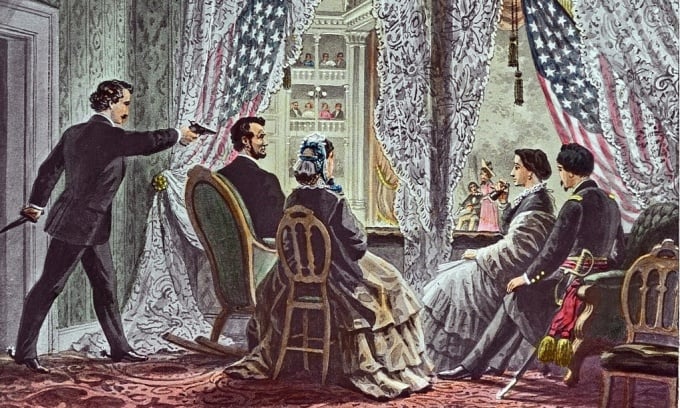Shortly before his assassination in 1865, Abraham Lincoln recounted a dream about "a dead president in the White House" to his wife and several friends.
On the night of April 14, 1865, at Ford's Theatre in Washington, D.C., President Abraham Lincoln was shot and killed by actor John Wilkes Booth while watching a play. The assassination took place at the end of the American Civil War between the Union and the Confederacy. After Lincoln was elected president in 1860, 11 slave states in the South declared their secession and formed the Confederacy. The remaining 25 states supported the government known as the Union.
Booth and other Confederate sympathizers wanted to kill three of the Union's most important officials: President Lincoln, Vice President Andrew Johnson, and Secretary of State William H. Seward. Seward was seriously wounded in an attack, and the Johnson conspirators ultimately did not carry out their plan. The American Civil War ended in May 1865 with a Union victory.
Ward Hill Lamon, Lincoln's friend and bodyguard, was absent on the night of the president's assassination. But Lamon recounted that he was "one or three people present" when the 16th president of the United States recounted a disturbing dream just days before his assassination.

Painting depicting the moment President Lincoln was assassinated. Photo: Wikipedia
According to the story, President Lincoln had a special dream about 10 days before the conversation with the group. Just as he fell asleep, he heard "sounds like small sobs". Lincoln went downstairs to find out where they were coming from but did not encounter anyone until he stepped into the East Room of the White House. At this time, he discovered "a terrible surprise": A covered corpse lying on the carpet, surrounded by soldiers and mourners.
"Who died in the White House?" he asked a guard. The answer stunned Lincoln: "The President, he was assassinated."
Lincoln said he was awakened by the "loud wailing of the crowd" and could not go back to sleep. From then on, the president felt strangely uneasy, according to Lamon.
However, Lincoln added to Lamon that "in this dream, it was not I, but someone else, who was killed. It seemed that the assassin had struck at someone else."
Some historians have expressed skepticism about Lamon’s account, which was first published in the 1880s, nearly 20 years after the assassination. What they wonder most is why, if it was true, Lamon and First Lady Mary Lincoln, who was reportedly present when Lincoln recounted the dream, did not mention it immediately after his assassination.
Pulitzer Prize-winning historian Don Edward Fehrenbacher also expressed skepticism about Lamon's account. However, he noted that many prominent authors have taken Lamon's account as fact. Joe Nickell, a paranormal investigator, said it was not unusual for Lincoln to have such a dream, given that the president had been the target of several previous assassination attempts.
Lincoln was interested in the meaning of dreams and what they might portend about the future, both positive and negative. He wrote to his wife in 1863 while she was in Philadelphia with their 10-year-old son, Tad. Lincoln wrote that Mary had better “put away Tad’s pistol” because he “had a very bad dream about it.”
Members of Lincoln's cabinet also recounted that on the morning of his assassination, the president told them he had a dream in which he was sailing very fast through dark, unknown waters. "I have had this dream many times in the past, before nearly every major event of the war," Lincoln said.
Vu Hoang (According to History )
Source link
























![[Photo] National Assembly Chairman Tran Thanh Man visits Vietnamese Heroic Mother Ta Thi Tran](https://vphoto.vietnam.vn/thumb/1200x675/vietnam/resource/IMAGE/2025/7/20/765c0bd057dd44ad83ab89fe0255b783)










































































Comment (0)